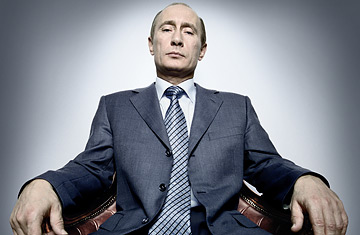
(2 of 6)
Elected Emperor
Putin has said that next spring, at the end of his second term as President, he will assume the nominally lesser role of Prime Minister. In fact, having nominated his loyal former chief of staff (and current Deputy Prime Minister) Dmitri Medvedev to succeed him as President, Putin will surely remain the supreme leader, master of Russia's destiny, which will allow him to complete the job he started. In his eight years as President, he has guided his nation through a remarkable transformation. He has restored stability and a sense of pride among citizens who, after years of Soviet stagnation, rode the heartbreaking roller coaster of raised and dashed expectations when Gorbachev and then Yeltsin were in charge. A basket case in the 1990s, Russia's economy has grown an average of 7% a year for the past five years. The country has paid off a foreign debt that once neared $200 billion. Russia's rich have gotten richer, often obscenely so. But the poor are doing better too: workers' salaries have more than doubled since 2003. True, this is partly a result of oil at $90 a barrel, and oil is a commodity Russia has in large supply. But Putin has deftly managed the windfall and spread the wealth enough so that people feel hopeful.
Russia's revival is changing the course of the modern world. After decades of slumbering underachievement, the Bear is back. Its billionaires now play on the global stage, buying up property, sports franchises, places at élite schools. Moscow exerts international influence not just with arms but also with a new arsenal of weapons: oil, gas, timber. On global issues, it offers alternatives to America's waning influence, helping broker deals in North Korea, the Middle East, Iran. Russia just made its first shipment of nuclear fuel to Iran—a sign that Russia is taking the lead on that vexsome issue, particularly after the latest U.S. intelligence report suggested that the Bush Administration has been wrong about Iran's nuclear-weapons development. And Putin is far from done. The premiership is a perch that will allow him to become the longest-serving statesman among the great powers, long after such leaders as Bush and Tony Blair have faded from the scene.
But all this has a dark side. To achieve stability, Putin and his administration have dramatically curtailed freedoms. His government has shut down TV stations and newspapers, jailed businessmen whose wealth and influence challenged the Kremlin's hold on power, defanged opposition political parties and arrested those who confront his rule. Yet this grand bargain—of freedom for security—appeals to his Russian subjects, who had grown cynical over earlier regimes' promises of the magical fruits of Western-style democracy. Putin's popularity ratings are routinely around 70%. "He is emerging as an elected emperor, whom many people compare to Peter the Great," says Dimitri Simes, president of the Nixon Center and a well-connected expert on contemporary Russia.
Putin's global ambitions seem straightforward. He certainly wants a seat at the table on the big international issues. But more important, he wants free rein inside Russia, without foreign interference, to run the political system as he sees fit, to use whatever force he needs to quiet seething outlying republics, to exert influence over Russia's former Soviet neighbors. What he's given up is Yeltsin's calculation that Russia's future requires broad acceptance on the West's terms. That means that on big global issues, says Strobe Talbott, president of the Brookings Institution and former point man on Russia policy for the Clinton Administration, "sometimes Russia will be helpful to Western interests, and sometimes it will be the spoiler."
Up from the Ruins
How do Russians see Putin? For generations they have defined their leaders through political jokes. It's partly a coping mechanism, partly a glimpse into the Russian soul. In the oft told anecdotes, Leonid Brezhnev was always the dolt, Gorbachev the bumbling reformer, Yeltsin the drunk. Putin, in current punch lines, is the despot. Here's an example: Stalin's ghost appears to Putin in a dream, and Putin asks for his help running the country. Stalin says, "Round up and shoot all the democrats, and then paint the inside of the Kremlin blue." "Why blue?" Putin asks. "Ha!" says Stalin. "I knew you wouldn't ask me about the first part."
Putin himself is sardonic but humorless. In our hours together, he didn't attempt a joke, and he misread several of our attempts at playfulness. As Henry Kissinger, who has met and interacted with Russian leaders since Brezhnev, puts it, "He does not rely on personal charm. It is a combination of aloofness, considerable intelligence, strategic grasp and Russian nationalism" (see Kissinger interview).
To fully understand Putin's accomplishments and his appeal, one has to step back into the tumult of the 1990s. At the end of 1991, just a few months after Yeltsin dramatically stood on a tank outside the parliament in Moscow to denounce—and deflate—a coup attempt by hard-liners, the Soviet Union simply ceased to exist. Yeltsin took the reins in Russia and, amid great hope and pledges of help from around the world, promised to launch an era of democracy and economic freedom. I arrived in Moscow a week later, beginning a three-year stint as a Russia correspondent.